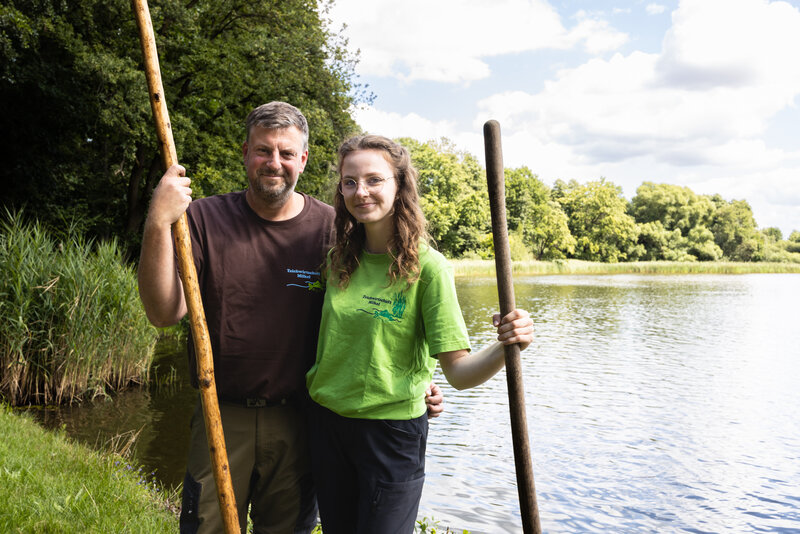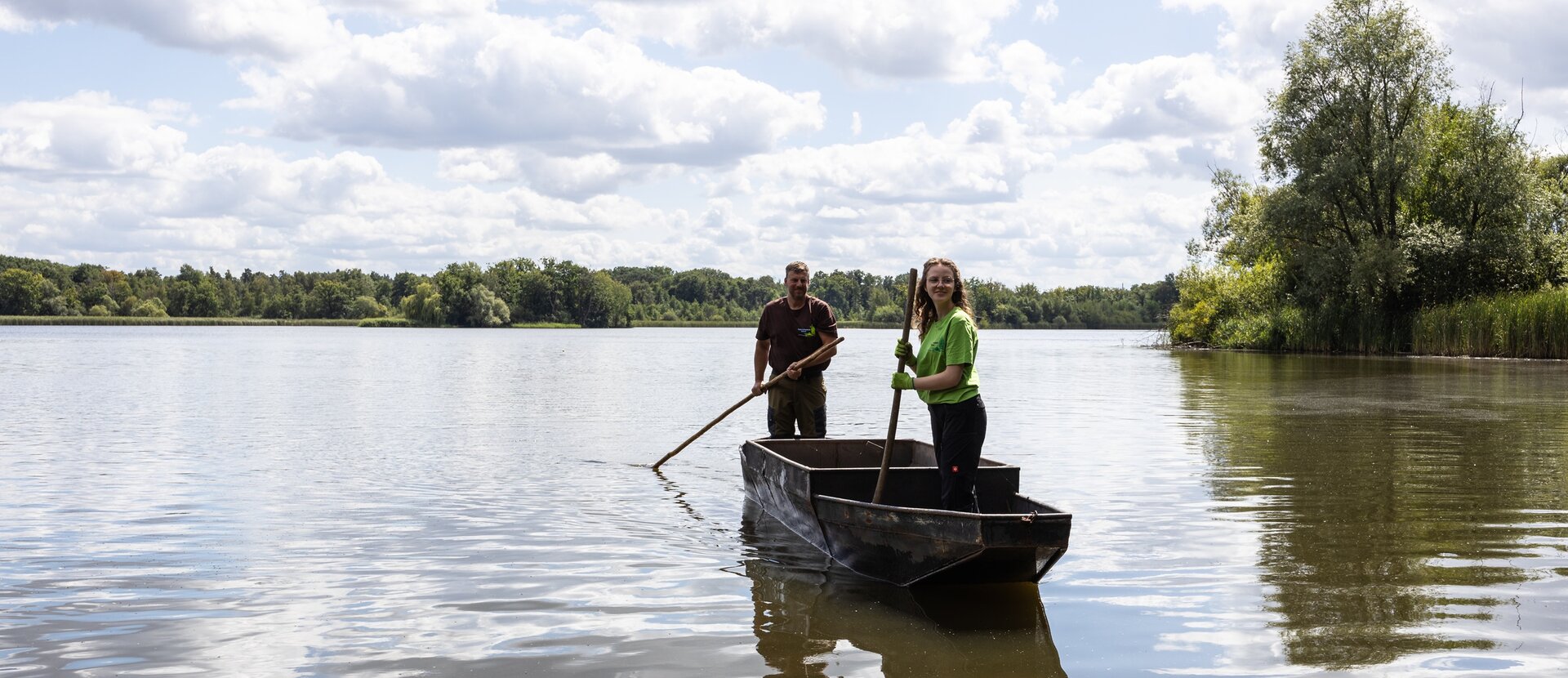
© Mario Kegel
The water in the pond looks sluggish. A mirror-smooth surface under the late summer midday sun. But there is movement beneath the surface. Lars Hempel stands on the bank, his hands on his hips. "They're already waiting," he says. On the back of his van is what the carp are already waiting for in the water: tasty wheat grains. These should ensure that the fish put on weight in the coming weeks. In the fall, the fish are finally caught. "We're usually here in the morning," says the 45-year-old. "Today we feed later, which makes the fish impatient." As part of the "24th Lusatian Fish Weeks", which begin on September 20, Lars Hempel holds the title of "Pond Host of the Year" this year - and is therefore representative of the many people in Upper Lusatia who work in the fishing industry.
Lars Hempel grew up between ponds. His grandfather was a fisherman, as was his father. "I never wanted to do anything else." Until 1992, the fishing farm in Milkel in Upper Lusatia, which is located right next to the village's beautiful castle, belonged to VEB Binnenfischerei Königswartha. However, the political change brought the end of the business shortly afterwards. "Our hearts were attached to the area, and my husband to his profession," recalls mother Annegret Hempel. So they bought the farm in 1992 - a gamble in what was a new market economy for everyone. "We had to learn a lot of things first, which was sometimes hard," she continues.
Even these difficult times did not deter Lars Hempel from his career aspirations. He studied at the Königswartha fishing school. Then came a stroke of fate: his father died in 2001, even before he completed his apprenticeship. Lars Hempel was just 21 years old at the time. The future of the family business suddenly depended on him. "We decided as a family back then: We'll carry on," he says. Looking back, that was the right decision.
Quality for the plate
Together with his daughter Pia, he pushes a narrow metal barge into the water, directly under the tipping loading area of his vehicle. The wheat slowly trickles into the boat. Then it sets off. Not with the help of a motor or paddle. Hempel pushes the boat forward with a long wooden pole. A small mound of grain lies on top. The water is still. Pia grabs a shovel, picks up a load of wheat and tips it into the water. Shoveling, shoveling, shoveling, shoveling. The grain lands in the water at a steady pace.
As soon as the first grains touch the surface, carp heads briefly appear, fins cut the surface of the water. Some fish jump up, turning halfway in the air - little pirouettes. "It's a spectacle every time," says Annegret Hempel, who watches from the shore. "You can see that they know us." The fish are particularly familiar with Hempel's feeding round. Markings in the water near the shore show where to go. Lars sticks the boat alongside them and checks the bottom with the wooden pole at the marks. "He looks to see if there is any food there from the last feeding," explains his mother. Nothing to be found. The 15,000 or so fish in this 32-hectare pond have done a great job.
Today, the Hempels look after 28 ponds, covering a total of 260 hectares of water. They are located in the middle of the UNESCO Upper Lusatian Heath and Pond Landscape Biosphere Reserve. It is a unique cultural landscape that is home to thousands of animals, birds and plants. Without centuries of management by fishermen, this network of ponds, meadows and forests would silt up and lose its biodiversity. "Lusatian fish" is not just a regional specialty, but a sustainable, nature-loving fishing industry. Carp, pike, tench and other species grow in clean waters, cultivated using traditional methods.
Vacation in the pond landscape
Lars Hempel feeds the fish in the ponds three times a week. They should be the right weight in the fall - and have the best taste. "That's why we have our holding facilities," explains Hempel. Large tanks in which the fish swim in the fall and winter. Fresh water from the River Spree constantly flows in and out. "This means the carp lose the muddy, muddy taste that many people unfortunately still associate with the fish," explains the senior manager.
In fall and winter there is a farm sale. Always from October to April from 8 a.m. to 12 p.m. or spontaneously at other times by arrangement. Ready-to-cook fish, filleted, the bones cut. "Many people are more likely to try it this way," she says. She cuts the fillets herself. "I used to be a sales clerk. I would never have dreamed that I would be cutting up fish." In addition to the fish business, the family has a second mainstay: two vacation apartments directly on the farm. Guests from all over Germany, the Netherlands and the Czech Republic book them. Some summer guests come back in the fall to watch the fishing or eat fresh fish.
Many want to know how a fish gets from the pond to the plate. And the guests enjoy the wonderful tranquillity of the ponds.
On the first weekend in November, the peace and quiet traditionally comes to an end. That's when the big fishing takes place. Helpers then support the Hempel family. It wouldn't be possible without them. Several weeks before the event, the water in the ponds is slowly drained. The fish collect in the so-called fish pits, deeper areas near the banks. The fish can then be easily removed from there. After work, Annegret Hempel's delicious fish soup is served - a legendary reward and popular with all those who lend a hand.
A job with many faces
In winter, the ponds are dormant - but not the business. The banks have to be cleared here and there, holes in the paths repaired, branches and wood removed. Lars Hempel is not just a fisherman. He is a path maintainer, landscape conservationist and sometimes a forester. "And unfortunately also quite often an office worker," he says. Permits are required for a lot of work in the biosphere reserve. So there is a lot of paperwork. "It's a job that really involves a lot," says Lars' wife Annett. When they first met, she was surprised at how varied the work on the farm is. "Most people don't even realize that." She works in a public authority, but has learned a lot about fishing over the years. "I even eat fish now, which wasn't my cup of tea before." She will soon have to learn even more, including how to cut fish fillets. Mother-in-law Annegret Hempel wants to hand over the reins of the business to her son next year at the latest.
Back at the pond. Pia shovels, Lars sticks. As the 18-year-old empties the last shovel, it slowly becomes quiet again under the surface of the water. "That's it for today," says the pond owner and pulls the boat onto the shore. A swan slowly swims up, dives with its long neck and searches for food. Not every inhabitant of the pond is that frugal. Cormorants are fish thieves and make life difficult for fishermen in the region. Beavers destroy vegetation and build dams where water should flow freely. "That's another issue," says Lars Hempel and takes a deep breath. He looks at the pond. He likes being out here, in the middle of nature. "The best job in the world - but one that's really hard work."
The "24th Lusatian Fish Weeks" officially start on September 20. Numerous restaurants, pond farms and farm stores will be taking part and offering specialties based on Lusatian fish - from fresh carp to creative new interpretations. In addition to the gastronomic offerings, visitors can also expect markets, guided tours and events that provide insights into the centuries-old pond farming and sustainable fish farming in the region.
All events can be found here.





